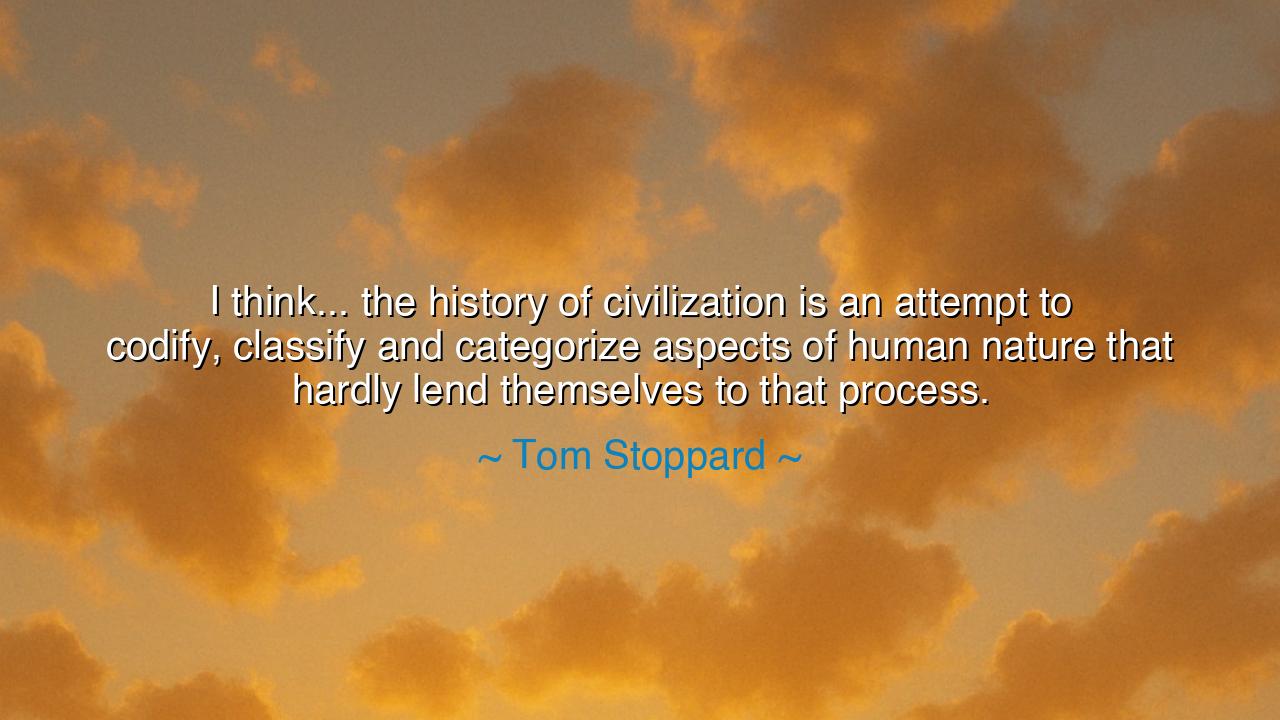
I think... the history of civilization is an attempt to codify
I think... the history of civilization is an attempt to codify, classify and categorize aspects of human nature that hardly lend themselves to that process.






“I think… the history of civilization is an attempt to codify, classify, and categorize aspects of human nature that hardly lend themselves to that process.” Thus spoke Tom Stoppard, a dramatist and philosopher disguised as a playwright, a man who spent his life questioning the logic of our ordered world. Beneath the calm rhythm of his words lies a storm of insight—for what he declares is nothing less than a meditation on the eternal struggle between structure and spirit, between the rational mind that seeks to define, and the boundless soul that refuses to be contained.
Stoppard’s observation reminds us that the story of civilization is not only the tale of cities and empires—it is the tale of humankind’s desperate need to make sense of itself. From the earliest codes of law carved into stone, to the modern sciences that measure thought and emotion, we have sought to capture the infinite complexity of human nature within the boundaries of reason. We have tried to codify the laws of morality, classify the instincts of behavior, categorize the mysteries of the heart. Yet Stoppard warns us that in this grand enterprise, we are always attempting the impossible: to imprison the ocean of the human spirit within the glass of language and logic.
For what is human nature, if not wild, contradictory, and divine? Love and cruelty, faith and doubt, creation and destruction—they dwell side by side within us, defying all neat division. The poet cannot be reduced to psychology, nor the saint to philosophy, nor the sinner to law. Every time civilization tries to chart the map of the human heart, it discovers that the terrain changes with every generation. What was once virtue becomes folly; what was once heresy becomes truth. The attempt to fix human nature through systems—whether of government, religion, or reason—is like trying to cage the wind. It is noble, perhaps, but never complete.
History itself provides endless proof of this truth. Consider the Age of Enlightenment, when the thinkers of Europe sought to order the universe through logic and law. They wrote constitutions, treatises, and declarations of rights, believing that humanity could be made perfect through reason. And yet, within a century, the same nations that preached liberty birthed tyranny; the same sciences that promised progress built weapons of annihilation. The Enlightenment was not a failure, but a reminder—that no matter how precise the instruments of reason become, they cannot measure the depths of desire, fear, or faith that stir the human heart. Civilization can guide behavior, but it cannot manufacture wisdom; it can refine conduct, but it cannot perfect the soul.
Yet there is beauty in the attempt. Stoppard does not condemn civilization’s effort to understand itself—he simply reminds us of its limits. To codify is to seek knowledge; to classify is to pursue understanding; to categorize is to bring order to chaos. These are noble pursuits, and without them, humanity would still dwell in darkness. But wisdom begins when we acknowledge that not everything can be named or numbered. The greatest truths of existence—love, grief, wonder, mercy—exist beyond the reach of science or statute. They live in art, in silence, in the quiet depths of being. When civilization forgets this and seeks to replace mystery with method, it loses touch with its soul.
Consider the life of Vincent van Gogh, whose art defied the categories of his time. He could not be neatly classified—too spiritual for science, too emotional for reason, too raw for polite society. Yet his work revealed something truer than any doctrine: the beauty of suffering, the sanctity of the broken heart. The world tried to define him, to diagnose him—but his genius escaped every label. His story is the very embodiment of Stoppard’s idea: that the most profound elements of human nature—creativity, madness, love, and pain—cannot be confined by the language of civilization. They are the eternal wilderness within us, the part of the human story that cannot be written, only lived.
And so, what lesson should we take from Stoppard’s words? It is this: seek understanding, but do not demand certainty. Build laws, but remember compassion. Pursue knowledge, but leave space for mystery. Civilization is necessary—it gives form to life—but never let its order erase your humanity. The poet, the dreamer, the artist, the lover—they remind us that the essence of being human cannot be measured or named. It can only be felt, experienced, and shared.
Therefore, let us honor both the builder and the dreamer. Let us build our societies with wisdom, but also with humility—knowing that what we call progress is only a reflection of our longing to understand ourselves. And in that longing lies both our tragedy and our triumph. For though we may never fully codify the human heart, the attempt itself is what makes us human: creatures forever reaching beyond the limits of our own design, forever seeking meaning in the infinite mystery of our own nature.






AAdministratorAdministrator
Welcome, honored guests. Please leave a comment, we will respond soon